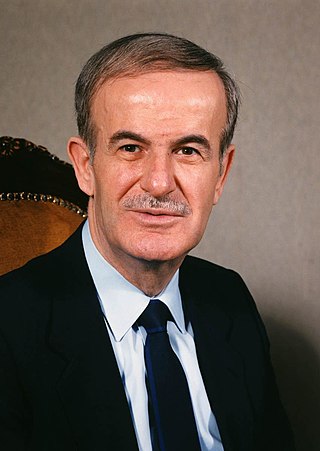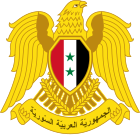
Politics in the Syrian Arab Republic takes place in the framework of a semi-presidential republic with nominal multiparty representation in parliament but with most opposition parties suppressed. President Bashar al-Assad, and his Arab Socialist Ba'ath Party have remained dominant forces in the country's politics since the 1970 coup d'état.
Mahmoud Al-Zoubi was Prime Minister of Syria from 1 November 1987 to 7 March 2000.

Bashar Hafez al-Assad is a Syrian politician who has served as the 19th president of Syria since 17 July 2000. In addition, he is the commander-in-chief of the Syrian Armed Forces and the Secretary-General of the Central Command of the Arab Socialist Ba'ath Party, which nominally espouses a neo-Ba'athist ideology. His father and predecessor was General Hafez al-Assad, whose presidency between 1971 to 2000 marked the transfiguration of Syria from a republican state into a dynastic dictatorship tightly controlled by an Alawite-dominated elite composed of the armed forces and the Mukhabarat, who are loyal to the Assad family.

Walid Kamal Jumblatt is a Lebanese Druze politician and former militia commander who has been leading the Progressive Socialist Party since 1977. While leading the Lebanese National Resistance Front and allying with the Amal Movement during the Lebanese Civil War, he worked closely with Suleiman Frangieh to oppose Amine Gemayel's rule as president in 1983. After the civil war, he initially supported Syria but later led an anti-Assad stance during the start of the Syrian Civil War. He is still active in politics, most recently leading his party, the Progressive Socialist Party (PSP) in the 2022 Lebanese general election.

The president of Syria, officially the president of the Syrian Arab Republic is the head of state of the Syrian Arab Republic. They are vested with sweeping powers that may be delegated, at their sole discretion to their vice presidents. They appoint and dismiss the prime minister and other members of the Council of Ministers and military officers. Bashar al-Assad is the 19th and current president of Syria. Bashar Al-Assad is the son of former president, Hafez al-Assad, who was the longest-serving president serving 29 years. Al-Assad is currently the second longest-serving president marking the 22nd year of his presidency in 2022 when he entered the post on 17 July 2000.

A civil war has been going on in Syria since 2011, following a period of demonstrations and unrest in 2011, which was part of the international wave of protest known as the Arab Spring. The government, headed by Bashar al-Assad, son of previous leader Hafez al-Assad, is based in Damascus, the traditional capital.

Bassel al-Assad was a Syrian engineer, colonel, equestrian and politician who was the eldest son of Syrian President Hafez al-Assad and the older brother of (later) President Bashar al-Assad. It was widely expected that he would succeed his father as President of Syria until he died in a car accident in 1994.

Abdul Halim Khaddam was a Syrian politician who was Vice President of Syria and "High Commissioner" to Lebanon from 1984 to 2005. He was long known as a loyalist of Hafez Assad until he resigned from his position and left the country in 2005 in protest against certain policies of Hafez's son and successor, Bashar Assad. He accumulated substantial wealth while in office: a Credit Suisse account, opened in 1994, was nearly 90 million Swiss francs in September 2003, per Suisse secrets.
Jamil al-Assad was a younger brother of the late Syrian president Hafez al-Assad, and the uncle of present Syrian leader Bashar al-Assad. He served in the Parliament of Syria, called the majlis ash-sha'b from 1971 until his death. He was also commander of a minor militia.
Bouthaina Shaaban is a Syrian politician and political and media adviser to the President of Syria, Bashar al-Assad. Shaaban served as the first Minister of Expatriates for the Syrian Arab Republic, between 2002 and 2008, and has been described as the Syrian government's face to the outside world.

The al-Assad family, also known as the Assad dynasty, has ruled Syria since General Hafez al-Assad became President of Syria in 1971 under the Ba'ath Party. After his death, in June 2000, he was succeeded by his son Bashar al-Assad.

Parliamentary elections were held in Syria on 7 May 2012 to elect the members of the Syrian People's Council. The elections followed the approval of a new constitution in a referendum on 26 February 2012.

Presidential elections were held in Syria on 8 February 1978. There was only one candidate, Hafez al-Assad, with voters asked to approve or reject his candidacy. A reported 99.9% of voters voted in favour, with a turnout of 97%.

Presidential elections were held in Syria on 10 February 1985. There was only one candidate, Hafez al-Assad, with voters asked to approve or reject his candidacy. A reported 99.99% of voters voted in favour, with a turnout of 94.5%.

Presidential elections were held in Syria on 2 December 1991. There was only one candidate, Hafez al-Assad, with voters asked to approve or reject his candidacy. A reported 99.99% of voters voted in favour, with a turnout of 99.1%.

Presidential elections were held in Syria on 10 February 1999. There was only one candidate, incumbent president Hafez al-Assad, with voters asked to approve or reject his candidacy. A reported 100% of voters voted in favour, with a turnout of 98%. Assad was re-elected for another seven-year term. However, he died in June 2000, resulting in an early presidential election that year.

AnisaMakhlouf was the matriarch of the Syrian Al-Assad family, which has ruled the country since 1971. The wife of the late Syrian President Hafez al-Assad, Makhlouf held the position of First Lady of Syria from 1971 until 2000. Her son Bashar al-Assad has been the President of Syria since 2000.

Presidential elections were held in Syria on 3 June 2014. There is a scholarly consensus that the elections were not democratic. The result was a landslide victory for Bashar al-Assad, who received over 90% of the valid votes. He was sworn in for a third seven-year term on 16 July in the presidential palace in Damascus.

Presidential elections were held in Syria on 26 May 2021, with expatriates able to vote in some embassies abroad on 20 May. The three candidates were incumbent president Bashar al-Assad, Mahmoud Ahmad Marei and Abdullah Sallum Abdullah. The elections were considered not to be free and fair.

Hafez al-Assad was the President of Syria, who ruled the country since the 1970 Corrective Movement, died from a heart attack on 10 June 2000 at the age of 69. His funeral was held three days later in Damascus, and he was buried in a mausoleum in his hometown Qardaha in Latakia Governorate, beside his eldest son Bassel al-Assad who died in 1994.



















